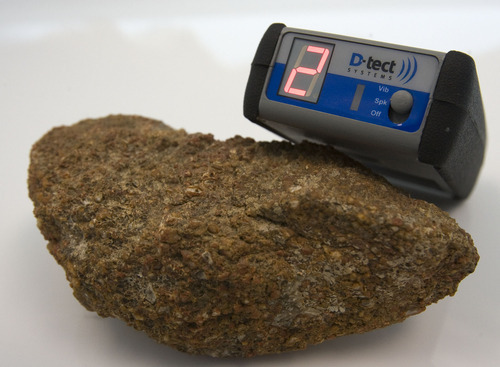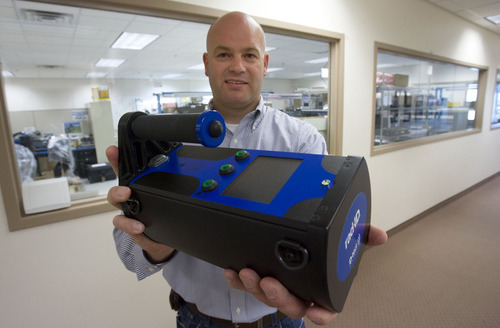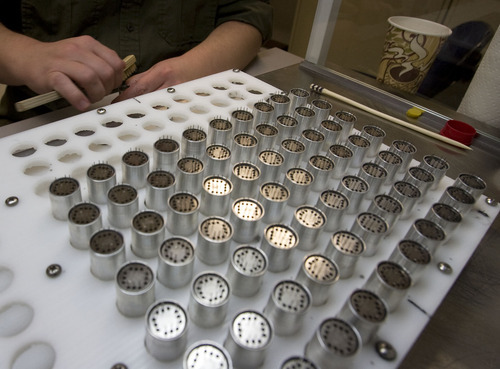This is an archived article that was published on sltrib.com in 2012, and information in the article may be outdated. It is provided only for personal research purposes and may not be reprinted.
In an episode of the television drama "NCIS," one of the characters sported a small, hand-held device with which he was able to detect a dirty bomb made of radioactive material that was about to go off. At that last second, agents disarmed the explosive, saving hundreds if not thousands of fictional lives.
The radiation detector was not, however, the work of a screen writer. It was made by a Utah company called D-tect Systems and it and other of the company's devices are being used by customers that include the Department of State, the Department of Defense and the Department of Homeland Security, as well as other first-responder agencies.
In the years since the Sept. 11, 2001, terrorist attacks, demand for the Draper company's products has soared. Since 2008, the company says it has had about a 400 percent increase in sales, including nearly 19 percent from 2010 to 2011. D-Tect Systems is a division of Visionary Products Inc., which employs 45 people. Of those, 33 are engineers, drafters and lab technicians.
"We're trying to help Homeland Security officials combat terrorism, trying to ... help them find a radioactive source before it can be used," said Gary Olsen, vice president of marketing.
D-tect has at least several things going for it in the marketplace where it faces competition from companies across the nation. Its devices are small and easy to use but also tough and sensitive.
Its MiniRad-D was featured on the "NCIS" episode and also has been used in a "CSI Miami" installment. It fits in the palm of a hand, can be worn on a belt or mounted in a vehicle to detect the presence of radioactive material.
The Department of Homeland Security tested the MiniRad-D and 14 other "Personal Radiation Detectors" in 2007 and rated the Utah company's product the best.
Besides federal agencies, police departments and other first responders use them, some daily.
"They are certain police departments around the country who carry them either on their person or in their vehicles," said Rob Harmon, director of business development.
D-tect Systems was founded in 2001 by Mission Research Corp., which contracted with Visionary Products Inc. to design instruments. Mission Research was sold to Alliant Techsystems in 2004, which in turn sold it in November 2009 to Visionary Products, a contract engineering and manufacturing company that was spun out of a Centers of Excellence program managed by the College of Engineering at Utah State University in Logan.
D-tect Systems' MiniRad-D automatically calibrates itself to take into account naturally occurring background radiation and can work in adverse conditions, including surviving a dunk in water. It can operate for about 5,000 hours on two AA batteries and is easy to use by first responders who often have a number of devices to master, said Olsen.
"We designed them with the goal that the products don't require a lot training."
MiniRads are sold by resellers for about $1,200 each.
The MiniRad-V can be mounted in a vehicle, such as a police car or fire truck, with an outside detector that sets off an alarm when a certain level of radiation is near.
Another product, the Rad-V can be mounted in doorways, driveways or loading docks. It can detect radiation coming from a shipping container, for example.
The company calls its Rad-ID a "radiation laboratory-in-a-box," a portable device that can identify different types of radiation.
Edd Johnson, of Rocky Mountain H.P. Consultants and a member of the Utah Radiation Control Board, said his review of the D-Tect products showed they operated within parameters set by regulations.
"There's a niche they can fit into," he said.
The D-tect devices are more sophisticated than a Geiger counter, which is capable of detecting radiation but can't identify different kinds, Johnson said.
"Most of the time when you take a Geiger counter out and you measure some clicks, it just says there's something giving off radiation close to it. They [D-tect] make one little hand-held instrument that's fairly pricey but will do what most instruments can't. It will measure the energy level of the radiation and in most cases it will compare it to a library it has and say, 'Here's the radioactive material that causing this radiation field.' "
The company also makes a portable device, six years or so in development, that detects and identifies a range of chemicals present in the air.
Chem-ID can be used by a HazMat team to detect what an overturned truck was carrying. Those instruments are pricey: The suggested price is $26,500.
The company just introduced the Rad-DX, radiation detectors that can be networked and operated remotely.
Besides the serious uses, the devices also can be a bit of fun, like the time a MiniRad-D alarm was triggered in a rock shop near Zions National Park and led a D-tect employee to buy the offending rock that now is used in the office to demonstrate how the devices work, Olsen said.
"Every time I go up to the State Capitol and I have this (MiniRad-D), it goes off outside because the granite has naturally occurring radiation in it.
tharvey@sltrib.com Twitter: @TomHarveysltrib







